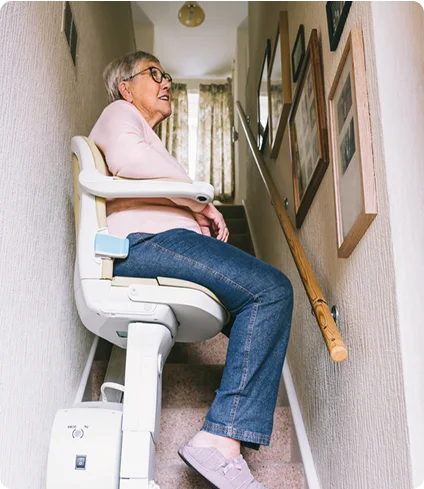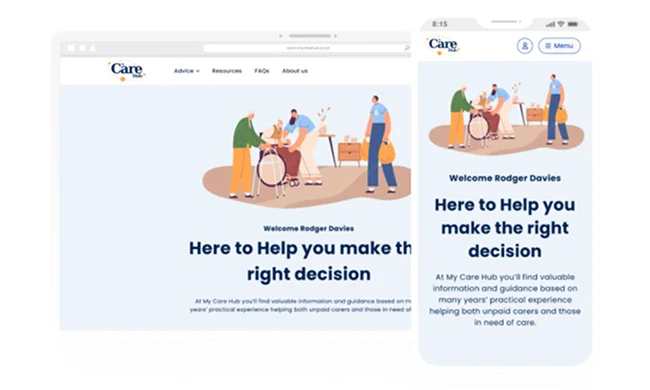Navigating Your Later Life Care Options
Age UK's latest state of health report shows over 2 million people in the UK over 65 have unmet care needs, and research by Carers UK, shows that, on average, half of women by age 46 and men by 57 have already become carers for an older adult. Paying for care is a key concern, and while releasing equity from your home is one option, our partnership with My Care Consultant helps you explore all your later life care choices.

Types of later life care
The overview below provides inspiration of where to potentially start your own research*, as there are different types of care that will impact your life and finances in different ways, the most well-known types of care are:
In-home care
In-home care, also known as homecare or domiciliary care, refers to support services in your own home to help you continue living independently and safely. It can include personal care, domestic support, mobility support and short-term recovery support. You could consider releasing equity from your home to fund in-home care.
Latest figures from the Homecare Association show the minimum price for homecare in England is at £32.41 per hour.

Care home
Care homes can be run by local councils, charitable organisations, and private companies. They're designed for people who can no longer live independently at home and according to Age UK there are four different types of care homes: standard / residential, nursing, dementia, and dual-registered. Equity release isn't always suitable for funding care home fees, especially if a move into residential care is likely.
Costs vary depending on the type of care home with a residential costing over £5,000 per month (figures from carehome.co.uk).

Adapting your home for care
You can make physical changes to your living space to support independent living, safety, and comfort for individuals with care needs. These home adaptations could include small changes like adding rails or extra lighting, or bigger changes like adding stairlifts or walk-in showers. A lifetime mortgage could enable you to release funds for home adaptations.
Costs for adaptations vary greatly and could be anything between £500 for smaller adaptations and £15,000 or more for larger renovations. Age UK provides more information on this.

*Disclaimer: Please note, the resources and statistics provided are correct as of time of writing, and are subject to change.
The 9 ways self-funders can pay for care
While social care is often the responsibility of local authorities, you may be required to pay for some or all of your care fees after a local authority based financial assessment is completed. In this scenario, you'd be classed as a self-funder and you'd have several options to consider.

Disclaimer: The 9 ways to pay for care is an informative resource developed by My Care Consultant and is not intended nor implied to be a substitute for independent financial advice.
1. Equity released from your property
You could release tax-free cash from your home with a lifetime mortgage. However, if you’re considering long-term residential care, equity release may not be suitable. Learn more about paying for care through a lifetime mortgage in this guide.
Paying for care guide2. Rental income from your property
Consider renting out your property if you're moving into a care home and using this income to fund your needs.
3. A Local Authority Deferred Payment Scheme
A government-backed arrangement that allows individuals who own their home to delay paying for long-term care costs by taking out a loan from their local authority.
4. Fund release from selling your property or downsizing
Downsizing into a property that better meets your home care needs can be beneficial.
5. Liquid assets like cash or income
Where you have sufficient liquid assets and/or income to pay for care fees for the foreseeable future.
6. Investments or portfolios
Using either new or existing investments, which generate investment income, investment capital or both to pay for care fees.
7. Pension funds
If suitable and after consulting with your adviser, you could consider using your existing pension funds to fund care needs.
8. Long Term Care Insurance Product (LTCI)
LTCIs are financial plans designed to help individuals cover the costs of extended care services.
9. Third-party top-ups
Third-party top-ups are additional payments to cover the difference between the cost of care and the amount the local authority is willing to fund.
It's important to understand the advantages and disadvantages of each payment method. Find out more about the pros and cons of equity release on our 'what is equity release' explainer page and learn more about the 9 ways self-funders by subscribing to My Care Consultant's My Care Hub.
Getting independent financial advice

Your financial adviser, whether a generalist or specialist equity release broker, may have links to care planning experts, including those focused on long-term care funding. It's best to speak with them early, as only regulated advisers can assess all care funding options, including plans that guarantee care fee payments for life.
When choosing an adviser, look for accreditation from the Society of Later Life Advisers (SOLLA) for added expertise. Be sure to ask about fees upfront, some charge a flat rate, and others work on commission. It's good to confirm how advisers will be paid and what services this includes before your first meeting.

My Care Hub supporting your care journey
My Care Hub is a unique online 'one stop shop' digital service that provides invaluable information, guidance, and support, not only for those in need of care but also the many millions of unpaid carers across the UK looking after an older adult. It provides clear, up-to-date and accurate guided information, to those self-navigating the complexities of the UK care systems. Subscribe to My Care Hub with the link below.
View My Care HubInformation: Confirm with your adviser if they're a subscriber to My Care Hub, as if they are, they will be able to email you a copy of these resources free of charge.

Key questions about care in later life
While your financial adviser is equipped to guide you through your options in paying for care, My Care Hub provides answers to common questions often faced by those in need of care, their unpaid carers, and their family members, such as:
Issues with finding suitable local care
- How do you know what care is suitable?
- Who pays for the local care?
- What if my care needs change?
Not being informed of the financial support that's available
- What state benefits can I get and how do I apply for them?
- How does an income and assets assessment work?
- What if I run out of funds while still needing care?
Accessing help from your local authorities and other frameworks
- How to get a care 'needs' assessment?
- How to challenge a local authority's decision?
- What happens when I'm discharged from hospital? What should happen and who is responsible for what?
If these questions resonate with you, and you're looking for more information on decision support tools or checklist screening, then explore the My Care Hub FAQs here >.

In partnership with
We're incredibly grateful to our partner, My Care Consultant, for making expert guidance on later life care (normally behind a chargeable subscription) exclusively available to Pure Retirement’s audience. Thank you My Care Consultant.
Is equity release an option to fund your care?
Find out more about how to fund care with equity release and what topics to consider when discussing with your financial adviser. Read our informative blog post below.
Read blog